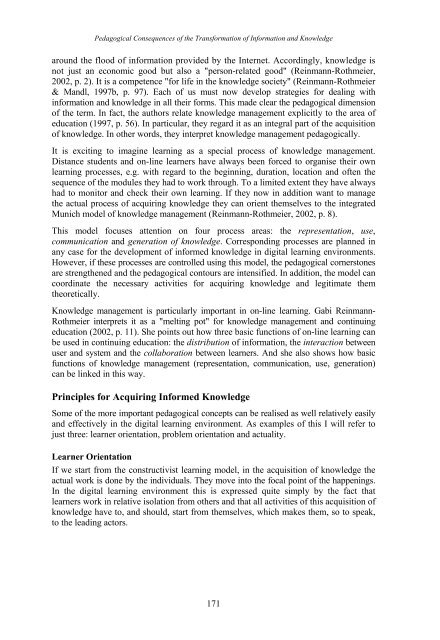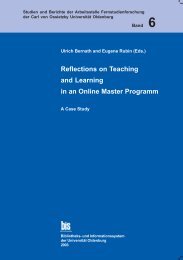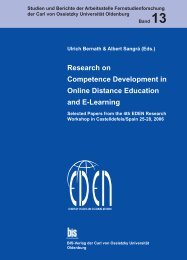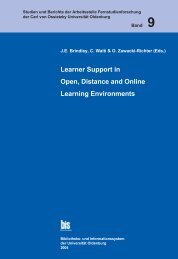Distance Education in Transition - Master of Distance Education ...
Distance Education in Transition - Master of Distance Education ...
Distance Education in Transition - Master of Distance Education ...
Create successful ePaper yourself
Turn your PDF publications into a flip-book with our unique Google optimized e-Paper software.
Pedagogical Consequences <strong>of</strong> the Transformation <strong>of</strong> Information and Knowledge<br />
around the flood <strong>of</strong> <strong>in</strong>formation provided by the Internet. Accord<strong>in</strong>gly, knowledge is<br />
not just an economic good but also a "person-related good" (Re<strong>in</strong>mann-Rothmeier,<br />
2002, p. 2). It is a competence "for life <strong>in</strong> the knowledge society" (Re<strong>in</strong>mann-Rothmeier<br />
& Mandl, 1997b, p. 97). Each <strong>of</strong> us must now develop strategies for deal<strong>in</strong>g with<br />
<strong>in</strong>formation and knowledge <strong>in</strong> all their forms. This made clear the pedagogical dimension<br />
<strong>of</strong> the term. In fact, the authors relate knowledge management explicitly to the area <strong>of</strong><br />
education (1997, p. 56). In particular, they regard it as an <strong>in</strong>tegral part <strong>of</strong> the acquisition<br />
<strong>of</strong> knowledge. In other words, they <strong>in</strong>terpret knowledge management pedagogically.<br />
It is excit<strong>in</strong>g to imag<strong>in</strong>e learn<strong>in</strong>g as a special process <strong>of</strong> knowledge management.<br />
<strong>Distance</strong> students and on-l<strong>in</strong>e learners have always been forced to organise their own<br />
learn<strong>in</strong>g processes, e.g. with regard to the beg<strong>in</strong>n<strong>in</strong>g, duration, location and <strong>of</strong>ten the<br />
sequence <strong>of</strong> the modules they had to work through. To a limited extent they have always<br />
had to monitor and check their own learn<strong>in</strong>g. If they now <strong>in</strong> addition want to manage<br />
the actual process <strong>of</strong> acquir<strong>in</strong>g knowledge they can orient themselves to the <strong>in</strong>tegrated<br />
Munich model <strong>of</strong> knowledge management (Re<strong>in</strong>mann-Rothmeier, 2002, p. 8).<br />
This model focuses attention on four process areas: the representation, use,<br />
communication and generation <strong>of</strong> knowledge. Correspond<strong>in</strong>g processes are planned <strong>in</strong><br />
any case for the development <strong>of</strong> <strong>in</strong>formed knowledge <strong>in</strong> digital learn<strong>in</strong>g environments.<br />
However, if these processes are controlled us<strong>in</strong>g this model, the pedagogical cornerstones<br />
are strengthened and the pedagogical contours are <strong>in</strong>tensified. In addition, the model can<br />
coord<strong>in</strong>ate the necessary activities for acquir<strong>in</strong>g knowledge and legitimate them<br />
theoretically.<br />
Knowledge management is particularly important <strong>in</strong> on-l<strong>in</strong>e learn<strong>in</strong>g. Gabi Re<strong>in</strong>mann-<br />
Rothmeier <strong>in</strong>terprets it as a "melt<strong>in</strong>g pot" for knowledge management and cont<strong>in</strong>u<strong>in</strong>g<br />
education (2002, p. 11). She po<strong>in</strong>ts out how three basic functions <strong>of</strong> on-l<strong>in</strong>e learn<strong>in</strong>g can<br />
be used <strong>in</strong> cont<strong>in</strong>u<strong>in</strong>g education: the distribution <strong>of</strong> <strong>in</strong>formation, the <strong>in</strong>teraction between<br />
user and system and the collaboration between learners. And she also shows how basic<br />
functions <strong>of</strong> knowledge management (representation, communication, use, generation)<br />
can be l<strong>in</strong>ked <strong>in</strong> this way.<br />
Pr<strong>in</strong>ciples for Acquir<strong>in</strong>g Informed Knowledge<br />
Some <strong>of</strong> the more important pedagogical concepts can be realised as well relatively easily<br />
and effectively <strong>in</strong> the digital learn<strong>in</strong>g environment. As examples <strong>of</strong> this I will refer to<br />
just three: learner orientation, problem orientation and actuality.<br />
Learner Orientation<br />
If we start from the constructivist learn<strong>in</strong>g model, <strong>in</strong> the acquisition <strong>of</strong> knowledge the<br />
actual work is done by the <strong>in</strong>dividuals. They move <strong>in</strong>to the focal po<strong>in</strong>t <strong>of</strong> the happen<strong>in</strong>gs.<br />
In the digital learn<strong>in</strong>g environment this is expressed quite simply by the fact that<br />
learners work <strong>in</strong> relative isolation from others and that all activities <strong>of</strong> this acquisition <strong>of</strong><br />
knowledge have to, and should, start from themselves, which makes them, so to speak,<br />
to the lead<strong>in</strong>g actors.<br />
171





